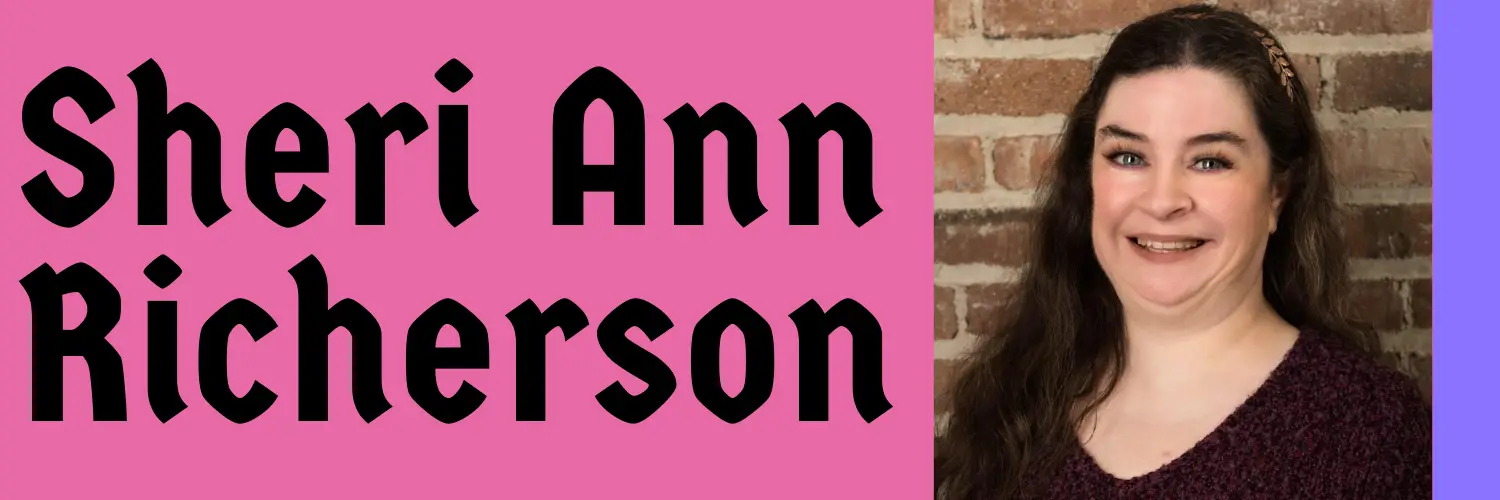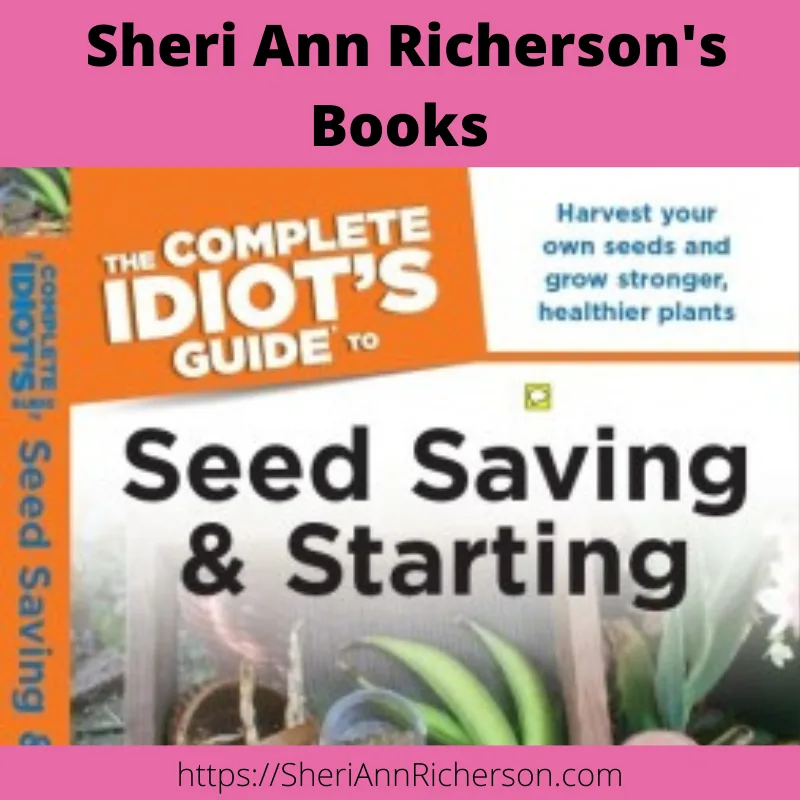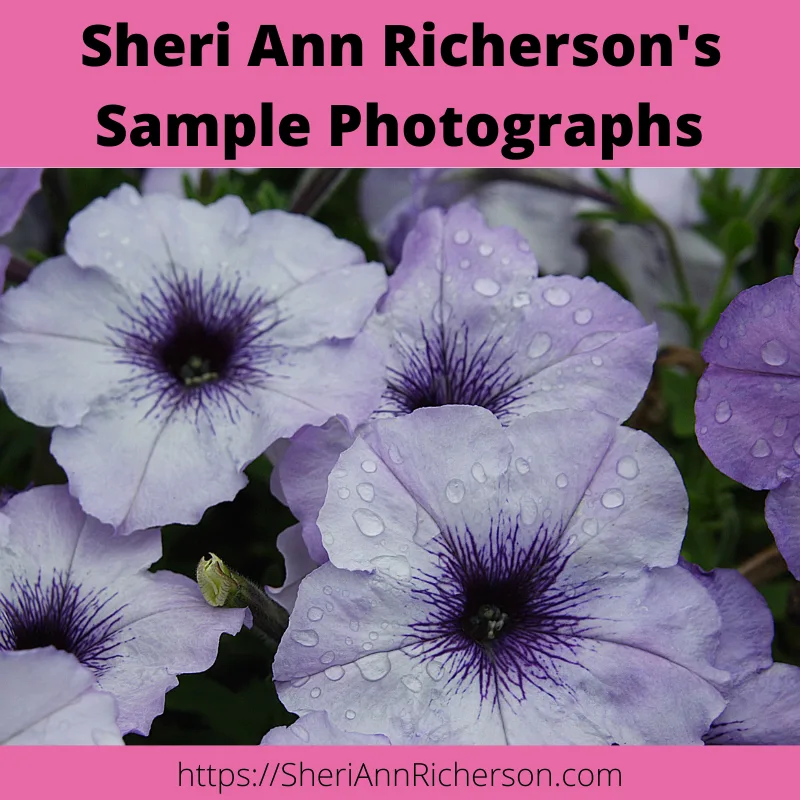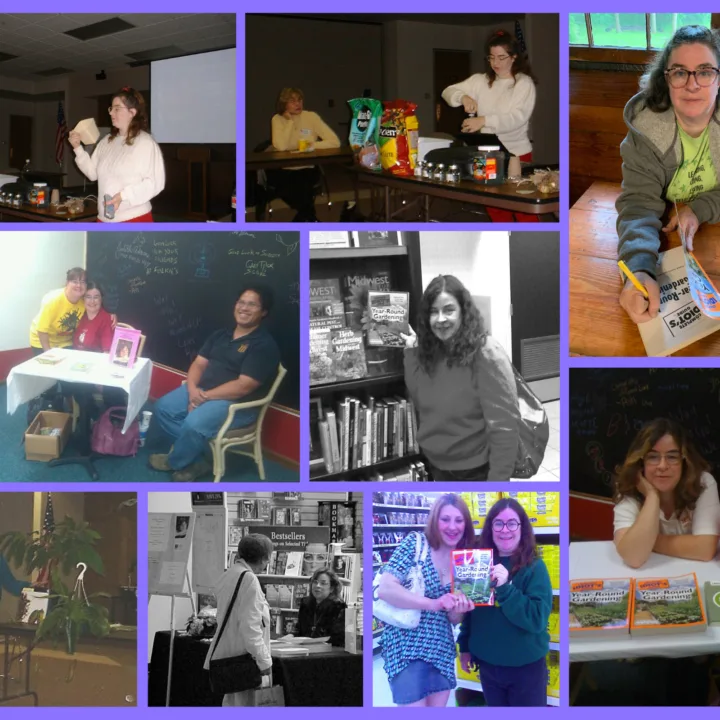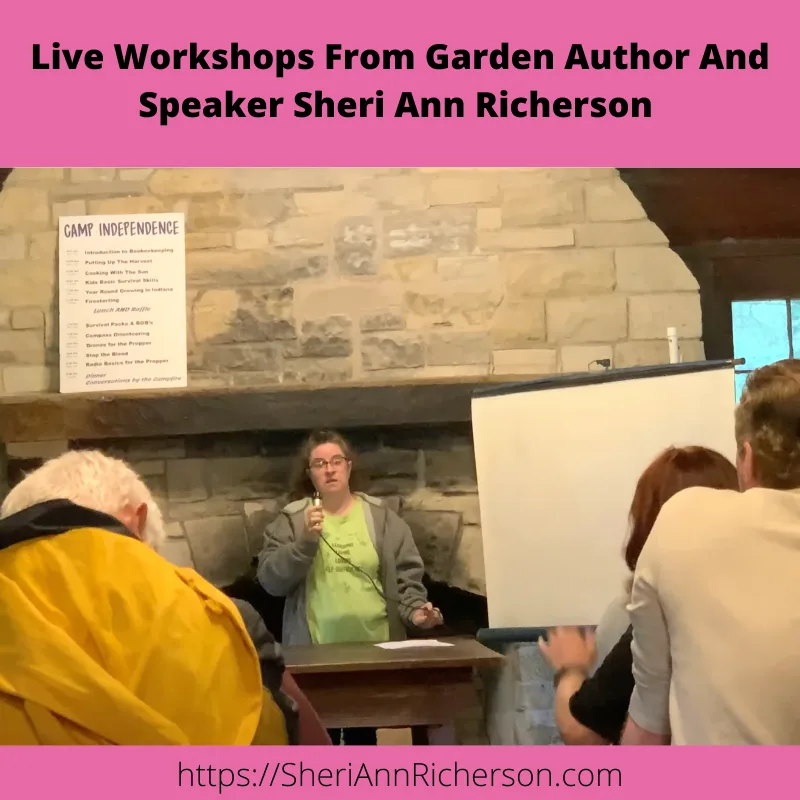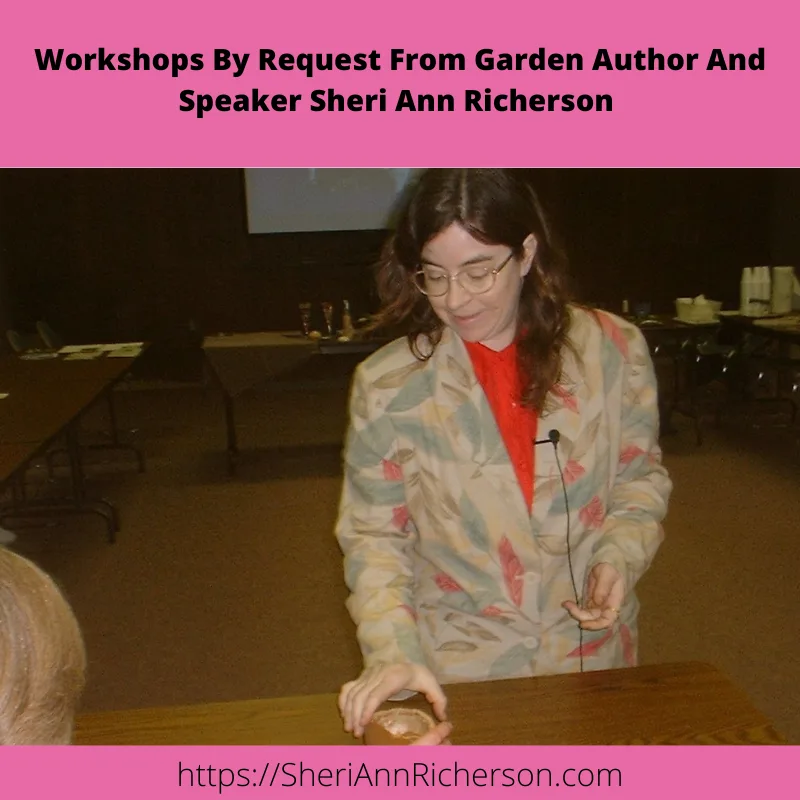Sheri Ann Richerson discusses organic gardening and what gardeners can do to become organic, as well as what beginners should be planting right now, plus her work in with Plant a Row for the Hungey, dedicated to planting food & donating food for those in need.
The LifeTips hosts are Byron White and Amanda Smith.
This was originally recorded on April 9, 2008.
If you would like to listen to the podcast, please visit https://wmr.fm/audio/8094/230227
Below is the actual transcript of the interview with Sheri Ann Richerson.
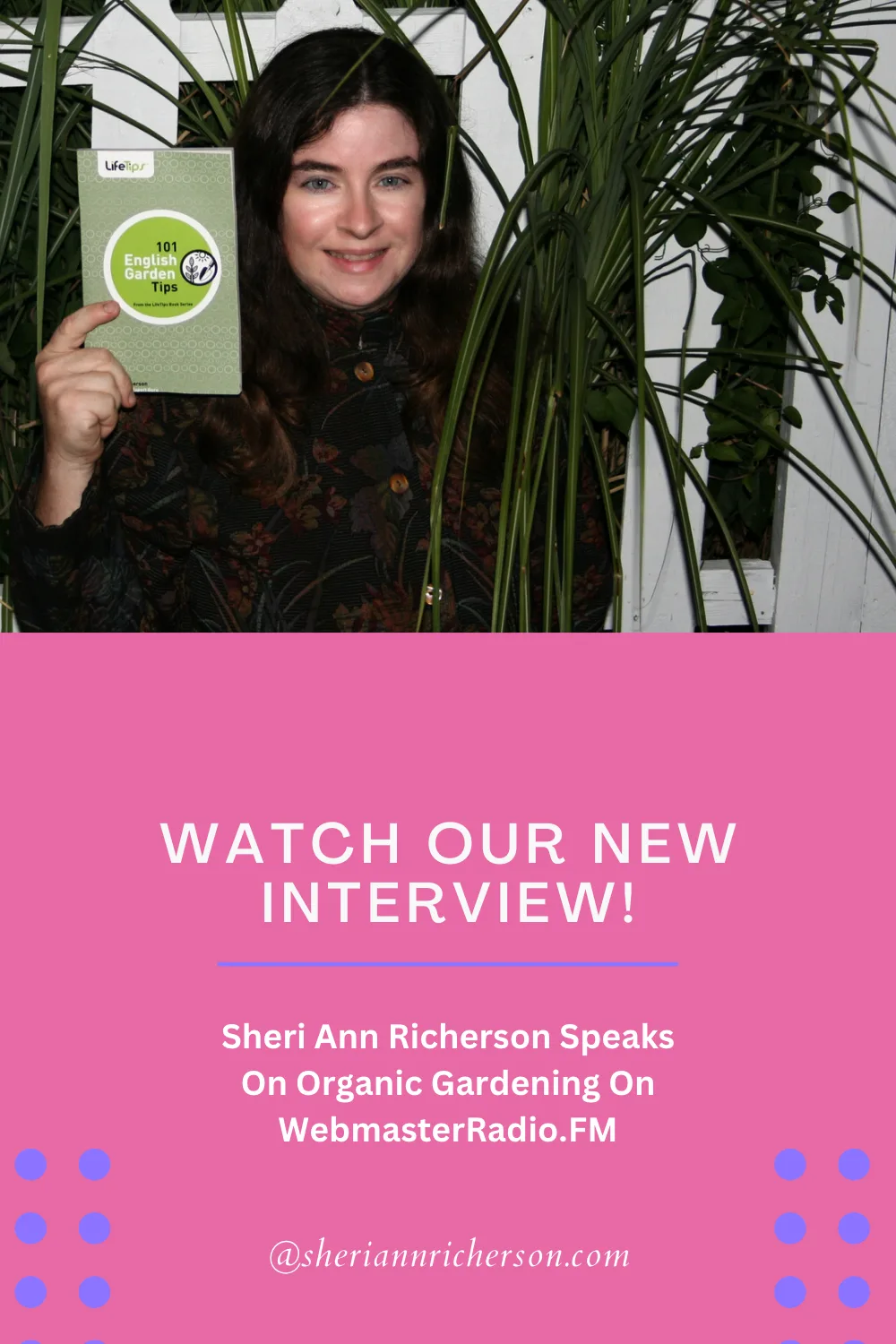
Lifetips Organic Gardening Interview
===
[00:00:00]
[00:00:00] Byron White: Welcome back everyone to our new improved intro and show. Today we’re going to be chatting with Sheri Ann Richerson. Welcome Sheri Ann. Welcome. Welcome. So welcome. Thanks. Thanks for helping us make the world a better place. No problem. . So today we’re gonna be chatting a little bit. Your background.
You are an author of a book called Magical Gardens, and you also have several books in production. A couple that are gonna be LifeTips books, which we’re excited about. One, about 101 tips on English Gardens and another 101 tips about organic gardening. So without further ado, tell us a little bit about your, your, your passion for gardening where, where it came from and, and what you’re doing with that.
[00:00:46] Sheri Ann Richerson: Well I started out with herbs because I love fragrant plants. Mm-hmm. And then I ended up starting to write on the web for LifeTips, Bella Online, Suite 101, [00:01:00] and I joined the Garden Writers Association and became involved with Plant Row for the Hungry and that’s a program that anyone can join even if they grow a tomato plant in a container.
There’s currently over 27,000 volunteers, but there’s a need for a lot more. You start up a program in your county and you donate your extra garden produce to local food pantries and soup kitchens, and it’s a great program. It’s a great way to give back to your community. And what I have done to make this statewide, because I’m actually a regional director, is I have gone to a lot of the correctional facilities in the state and got them involved.
And I have one, Plainfield Correctional Facility, that donated 6,985 pounds of produce last year.
[00:01:56] Byron White: Well, now is this a national [00:02:00] organization?
[00:02:01] Sheri Ann Richerson: Yes, this is national. It’s through the Garden Writers Association. Their website is gardenwriters.org and Carol Ledbetter is the program administrator and there are directors in every state, and I believe there are some international directors too.
And the program was started by Jeff Lowenfels from Anchorage, Alaska.
[00:02:26] Byron White: Fabulous. . I know Mandy has some questions before, but before she does. Tell us a little bit about about your interest in in organic gardening and and what your vantage point is with regards to what’s changing, what’s happening and what and how things are progressing with regards to our, our ability to protect the environment with organic gardening.
[00:02:49] Sheri Ann Richerson: Well as you may know, a lot of the pesticides that were used even as early as World War I are still in the ground, still affecting us. Chemicals [00:03:00] are not good. They’re manmade. While they may prevent some things, the insects and the diseases build up resistance over time, and then suddenly they don’t work.
Not only that, Everything that touches our skin absorbs into it. And when we eat these plants sprayed with pesticides or we wear clothing that has been made from items that are grown with or made using chemicals, we’re taking all this into our bodies and we’re ruining our health. Organic produce also has more nutritional value than produce grown with pesticides or chemical fertilizers. Kelp is a wonderful organic fertilizer that you can put on your garden and it has everything in it that plants need and they take this up and studies just show that produce grown organically is just [00:04:00] better for you.
And while there are no official studies, there are unofficial studies. People that have medical problems and switch over to the organic produce can actually help alleviate some of those problems. I had a bad experience myself. I went out to pick some tomatoes from a field and they had sprayed that field.
And they didn’t tell us. So as I was picking, my hands began to burn and I said something and they said, Oh, we forgot to tell you. We sprayed the field today and I brought the stuff home. We washed it twice. I went ahead and put the stuff up, and every time that I ate those tomatoes, I ended up getting sick. So I do believe that these chemicals are really bad for us.
They’re bad for the environment as well.
[00:04:55] Byron White: What type of sick did you get? Nauseous or, or, or some, [00:05:00] yeah.
[00:05:00] Sheri Ann Richerson: Yes. Very nauseous. . And even, even after I had froze them for a long time, it didn’t go away.
[00:05:07] Byron White: What’s your take on this organic phase that grocery stores are, are almost being forced into? I mean, I think the word is out there that, you know, go organic.
Organic is good. But I’m, I’m worried. Mm. You know, that we we’re still doing damage to, to the environment. Are, are we really sure that all of these products that we took, that we are, that are labeled or organic are in fact organic? Or is it just my own personal paranoia that , that I should be worried about here?
[00:05:37] Sheri Ann Richerson: Not all products are a hundred percent organic. They can say organic, even if they are not a hundred percent organic. Most products will say like 70%, 80%, you know, whatever. But you still really need to read for example, organic shampoo still contains formaldehyde. [00:06:00] So you do need to read and you need to be aware of what’s in the product.
And even if it says organic, when you bring it home, wash it. A lot of health food stores sell products that are designed to take pesticides off of regular fruits and vegetables. So you really need to be aware and if at all possible, grow your produce yourself, and that way you know what’s on it.
[00:06:29] Byron White: This raises my next tough question, and then we’re gonna let Mandy soften the blow here a little bit. So here’s the challenge that I have. If you are trying to feed a neighborhood in the middle of a city and you’re Whole Foods or you’re Stop And Shop or you’re Star Market. I mean, we’re talking about volumes of vegetables and fruits that need to [00:07:00] be sourced somewhere.
And you know this is a problem as the population grows. I mean, imagine the complexities they have in China. Billion people plus So I mean, what is the answer? Is there a logical answer here? Is it possible that more local farmers that are growing organically could somehow, you know, enter this mass distribution food chain necessary to massive infrastructures like cities. I mean, in other words, are we gonna run out of bandwidth if everyone migrates over to moving away from conventional products and into organic products? Is this gonna be a problem in the future?
[00:07:44] Sheri Ann Richerson: I don’t think it is because a lot of people, like I said, they’re learning to grow their own.
A lot of the new vegetables are being hybridized so that they are suitable for container gardening. Of course the big farms are going to eventually catch the drift and they’re [00:08:00] going to start switching over. Even though it takes at least three years to become certified organic, and during that time you cannot have any conventional chemicals on your land and then you have to go through the testing.
But I don’t think it’s going to be a problem. There’s a lot of farmers markets springing up locally that were not there, even last year, I mean, there’s a big surge. A lot of the grocery stores are buying local.
[00:08:29] Sheri Ann Richerson: thing is a lot of people are not willing to pay to get their product certified organic.
There is a certified naturally grown, which basically come out and they test your land to make sure there’s no chemical or pesticide residues on your land. And it is a little bit cheaper than the certified. But I think with the demand out there that these companies are gonna have no choice but to switch and like I said, it’s gonna take [00:09:00] time, but you know, they’re gonna be forced into it.
[00:09:07] Byron White: Hmm. Mandy, once you take it over from here. I don’t want to turn off my quest for knowledge by asking questions that are too difficult. This has really been fascinating enough from my perspective.
Go ahead, Mandy.
[00:09:20] Amanda Smith: You know what, Sheri, I’m, I’m gonna go easier on you. That was some pretty tough questioning. That’s he’s bad cop. I’m good cop. That’s how we work. So this week we’ll end on the easier questions. So you’re, you do a little bit of everything. You’re not just
[00:09:35] a gardener, you’re actually a master gardener.
You know, some
[00:09:39] amazing level of gardener.
[00:09:42] And in
[00:09:42] addition to that, you’re also a poet and you do wildlife work and, and you’re an author. I mean, you’ve done a lot of incredible stuff. You make me feel
[00:09:49] very lazy. . So tell me
[00:09:53] more about, about some of the other work you do.
[00:09:56] Sheri Ann Richerson: Well, I have a certified wildlife habitat.
[00:10:00] We have an acre and a half. We raise animals. We have a horse. We have dairy and cashmere goats. We have rabbits including Angora rabbits, and we have chickens and ducks. In addition to my writing I pretty well run the farm during the summer. The fiber that I collect off the cashmere goat and Angora rabbits I spin into yarn and use the yarn to make socks, sweaters and other items out of that yarn.
You know, I’m always out there trying to figure out the next way to go organic. We just recently found organic livestock feed and I have moved all of my animals over to that and they are so much happier.
[00:10:46] Amanda Smith: That’s fantastic. It’s really good to hear. Now back to your gardening. I don’t wanna get too far away from that since that is the gist of the show today, but is this a good time for people to get into amateur gardening?
If, if people are gonna start, this is the time of year to
[00:10:59] start, right?
[00:11:00] Sheri Ann Richerson: It is. And the good news is there are a lot of younger people under 30 that are now getting into gardening, and this is being seen at all of the garden shows around the country. The big interest this year is vegetable gardening.
[00:11:19] Amanda Smith: Really? Yes. Yes. Is that because of the organic movement?
[00:11:19] Sheri Ann Richerson: I think in part because of the organic movement, and I think because people are becoming more aware that they can be in charge of growing their own food. Gardening has been down in the past years and it’s real exciting to see a surge. And I believe I heard it was like a 17% surge.
I know it was up there and, you know, with just with the younger generation. So, and that’s really exciting because typically it’s been, you know, the older crowds that’s been into the gardening.
[00:11:56] Amanda Smith: Now if I was gonna get into gardening today, if I wanted [00:12:00] to go out to my local garden store and, and get everything together that I wanted to plant, what would be the best things to plant right now?
[00:12:07] Sheri Ann Richerson: Okay. You’d wanna look for bareroot roses and fruit trees. And you would wanna get those in the ground. And when you plant your roses, if you’re in a colder region, you need to plant them three inches below that graft line. Not like it says on the tag, because they won’t come back.
You would wanna look for cabbages and leafy type of vegetables. Those can go in the ground. Now you will wanna have a frost cover or something to cover them, just in case you would get a hard frost. Flowering vines can be plant at the 15th of this month. So seeds, vines, you know, whatever.
Tubers and bulbs such as potatoes, carrots, turnips, and spring bulbs can be planted now. And for gardeners in colder [00:13:00] regions, I’m in zone six. You can plant potatoes in November and December and be harvesting those in May.
[00:13:11] Amanda Smith: Really? That’s fantastic. It sounds like a lot. You know what, I’m not gonna lie, Sheri, it sounds like a lot of stuff and I have a black thumb.
Everything I touch dies. So are these easy things to get involved with? Are these sort of on the more advanced level? What am I looking at?
[00:13:24] Sheri Ann Richerson: Roses are a little more difficult. Most of your vegetables are really easy to grow, and they’re a good place to start. Herbs are easy to grow. They will pretty well grow in any soil.
They are not really that hard. Like I said, the roses would be the most difficult one because of having to plant them deeper, needing to amend the soil, the constant fertilization that’s needed with them. But vegetables and herbs are all really pretty easy, you know, preparing the soil is the big thing.
[00:14:00] Like you’d wanna add compost and kelp to your garden right now. And if your garden is not prepared, you would want to till it, put that on, let it set for a few days, and then till it again.
[00:14:15] Amanda Smith: Really? Okay. Yeah. Allright. I’m writing this down.
[00:14:20] Sheri Ann Richerson: Okay. If your garden is already tilled, you can simply put a three inches layer of compost on top of the soil and it will act like a mulch now, not three inches of the kelp, the compost, you can mix the kelp into the compost. Most plant roots only go six inches deep anyway, so the plants still benefit even if you just top dress the soil and that will act as a weed barrier.
[00:14:42] Amanda Smith: Interesting. Wow. So do you have any plants that are coming up
[00:14:45] Sheri Ann Richerson: Right now I have stuff in Bloom. I have Primrose. Daffodils, crocus, Dianthus. I can’t see my garden from here. I’m trying to think what else.
I [00:15:00] have witch Hazels that have
[00:15:00] been in bloom for weeks. I have tons of color out there right now.
Helleborus is in bloom. I had some cabbages that have survived through the winter outside, under a piece of glass. I have seeds in my greenhouse just going crazy. So I just took bag of Diatomaceous earth and kelp out and sprinkled on top of all those pots today in the greenhouse as pest control.
You can also put garlic powder and powdered cinnamon on top of greenhouse plants soil for pest control.
[00:15:36] Amanda Smith: Really? Yeah. Really? What, what does that control? What, what pests?
[00:15:37] Sheri Ann Richerson: Those little fruit flies, it controls those. The Diatomaceous Earth will control anything with a soft body that crawls like slugs.
Anything with the soft body because it’ll slice it up. And basically with the garlic, the cinnamon and the Diatomaceous Earth. I have no pest [00:16:00] problems in my green house.
[00:16:02] Amanda Smith: Really? Very interesting. That’s a good fact. That’s, that’s an excellent organic fact. I hope our listeners are writing that down.
Just so everybody knows, it’s a very good organic gardening tip. So now I know you brought some
[00:16:12] some other tips with
[00:16:13] you today, but before we get into that, I know that you’re doing some really great books for us and you’re in progress, and they should be coming along
[00:16:20] quickly. What is the difference between a regular garden and an English garden?
Because your whole book is gonna be 101 tips on English gardening. So
[00:16:28] what’s the difference between a normal garden and an English Garden?
[00:16:33] Sheri Ann Richerson: A normal garden. There’s space between the plants a lot of times. They can be more formal and English garden is kind of this, that and the other thing. And the plants are all together.
You might have a rose with a Delphinium or baby’s breath, or maybe some lavender, but the plants are all kind of in together touching one another, flowing together really.
[00:17:09] Amanda Smith: Okay. Okay. So it’s sort of [00:17:00] a free form garden. Yes, very much. Okay. Well, I can’t wait to read more of your tips on English gardening.
I’m very excited about your book. And then you also have the organic gardening book coming out right after that, in addition to a bajillion other books that you’re involved with. I don’t know how, I honestly don’t know how you do it. But do you have some tips for us today on,
[00:17:21] any good plants that you think are, are great on, you
[00:17:24] know, worth planting these days, or some of the best stuff on the market?
[00:17:27] Sheri Ann Richerson: One of the best gardening products that I’ve found there’s an item called a Cobra Head weeding tool. If you’re gonna garden, don’t do it without this little guy. It’ll take weeds out. It’s a little handle tool and it is just wonderful.
Amanda Smith: Is it expensive?
Sheri Ann Richerson: I don’t believe it is. Let me see if I can pull up a price here real quick. And then the other item that I just [00:18:00] found that goes with the Cobra weeding tool is called a circle hoe. It’s a little hand tool, it’s a circle and it’s like a hoe. And it does some of the smaller weeds.
The Cobra weeding tool is just 24.99.
[00:18:23] Amanda Smith: Oh, great. Okay. So worth the investment is what you’re saying?
[00:18:26] Sheri Ann Richerson: Oh yes. Without my Cobra weeding tool, I would just be so upset. After I found it, I really don’t know how I lived without it.
[00:18:37] Amanda Smith: Well, good then. I think that’s certainly a good tip for, for new gardeners or even established
[00:18:42] gardeners, I’m sure.
Sheri Ann Richerson: The circle hoe is great. So the small one, they say it’s more for working in pots and loosening the soil and pulling up weeds. But I use mine out in the garden and it is so sharp, and because it’s a hand tool, [00:19:00] you’re not dealing with a big long handle and it’s just a great little item and it’s just $14.95.
[00:19:09] Amanda Smith: Okay. Okay, so now, Now one quick
[00:19:12] question. My mom is a big gardener.
[00:19:15] Amanda Smith: She’s always having problems with dandelions, dandelion roots, dandelion problems. That’s all I ever hear about. I don’t really know what she’s talking about, but she’s always having dandelion
[00:19:23] problems. What, what does that mean?
Sheri Ann Richerson: I will tell you the easiest way to deal with dandelions, if she really doesn’t want them. I actually plant dandelions, not in my garden, but in the yard.
[00:19:39] Sheri Ann Richerson: If
[00:19:40] Sheri Ann Richerson: she goes down and she severs the root underground and takes the top off, after doing that two or three times, that dandelion is going to quit coming up because there’s nothing there above ground to create food to keep that dandelion alive.
[00:19:54] Amanda Smith: Okay. So, so beat it down until it learns. Its lesson.
[00:19:58] Sheri Ann Richerson: Yep.
[00:19:59] Amanda Smith: Yeah. [00:20:00] I like, I like your philosophy.
[00:20:02] Sheri Ann Richerson: And right now is a great time to remove weedss from flower beds and vegetable gardens. You wanna start that as soon as your soil can be worked and get a head start on these guys, because if they get ahead of you, you know you’ve got a problem,
especially in a large garden, I mean, you don’t want these weeds to get ahead of you. And there are organic control methods made out of corn available.
[00:20:29] Amanda Smith: Really? Okay. No, you’ve given us a ton of great information today. I mean, I actually would feel more comfortable going out and starting my own
[00:20:36] garden, having heard some of these
[00:20:37] tips.
But if, if somebody wants to consult, do you have a website that they can go to, to get some of these facts together?
[00:20:45] Sheri Ann Richerson: Yes. My website is ExoticGardening.com. I also have a blog, there’s a link to that on ExoticGardening.com. We have forums, we have articles available that people can come and read.[00:21:00]
that has a lot of information. We have a mailing list that has a newsletter that we send out that has lots of tips that are not even on the website. You know, we just have a ton of resources on there. And then like I said, if they don’t find what they’re looking for, they can ask in the forum
and they can also
[00:21:18] find a
[00:21:19] link to Plant A Row For The Hungry. The Plant A Row For The Hungry website with gardenwriters.org. We also have a Plant A Row For The Hungry Forum on our website, exoticgardening.com, so people can go in and ask questions or post how much they’ve donated or you can just basically ask anything about Plant A Row For The Hungry.
[00:21:49] Amanda Smith: Sounds wonderful. Sheri thank you so much for being with us today, for talking with us. I learned a lot from this interview. And you have two fantastic books coming up through LifeTips that we’re all very excited [00:22:00] about. So everyone be watching for 101 Life Tips Organic gardening and 101 LifeTips English gardens.
And that’s it for today. Thank you
[00:22:09] so much, Sheri Ann.
Sheri Ann Richerson: Well thank you.
Amanda Smith: Great. Well, we’ll see everybody next week.
Sheri Ann Richerson Presentations, Books And Events
Sheri Ann Richerson's Books
See the complete list of Sheri Ann Richerson's books and also get links to either Amazon or her personal Etsy Shop to purchase them.
Sheri Ann Richerson's Sample Photographs
Here are some examples of photographs taken by Sheri Ann Richerson. She does freelance photography work for magazines and catalogs.
Live Workshops
Are you looking for a garden speaker to present classes at your garden club or group? Sheri Ann Richerson does both live and online events.
